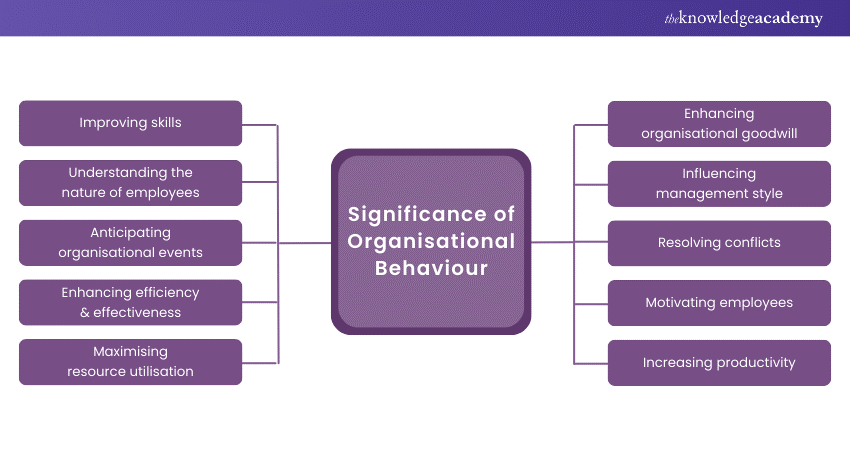We may not have the course you’re looking for. If you enquire or give us a call on 01344203999 and speak to our training experts, we may still be able to help with your training requirements.
Training Outcomes Within Your Budget!
We ensure quality, budget-alignment, and timely delivery by our expert instructors.

In today's dynamic and competitive business landscape, understanding the Importance of Organisational Behaviour (OB) is crucial for any enterprise aiming for sustained success. Organisational Behaviour includes many factors influencing how individuals and groups behave within an organisation.
From improving productivity to fostering a positive work culture, the significance of Organisational Behaviour cannot be overstated. Let's delve into the various aspects that highlight the Importance of Organisational Behaviour.
Table of Contents
1) What is Organisational Behaviour?
2) Importance of Organisational Behaviour
a) Improving skills
b) Understanding the nature of employees
c) Anticipating organisational events
d) Enhancing efficiency and effectiveness
e) Fostering a better organisational environment
f) Maximising resource utilisation
g) Enhancing organisational goodwill
h) Establishing improved communication channels and protocols
i) Creating a comfortable work environment
j) Influencing management style
3) Conclusion
What is Organisational Behaviour?
Organisational Behaviour (OB) studies how individuals and groups behave within organisations. It analyses individual traits, group dynamics, organisational structure, culture, leadership styles, and HRM practices. Understanding OB aids in optimising employee performance, team dynamics, and organisational culture.
It addresses challenges like diversity, globalisation, and Change Management. By applying OB insights, organisations can foster engagement, satisfaction, and productivity, ensuring sustained success in the dynamic workplace.
Importance of Organisational Behaviour
The following points are the Importance of Organisational Behaviour:

Improving skills
Skill development is of paramount importance in terms of Organisational Behaviour. These skills can be improved via strengthening communication, teamwork, leadership and problem-solving among the staff members. Through the recognition of divergent competencies and skills, plus identification of training gaps, companies can give personalised training and development activities, with a view to improving employees performance thus contributing to an organisation's success.
Understanding the nature of employees
Knowledge of personality traits is the foundation of Organisational Behaviour. It represents introducing yourself to your employees’ varying motives, attitudes, and patterns within the workplace. Identifying the special areas of concern and individual differences and needs enables organisations to provide relevant support and work on the development of environment that encourages worker engagement, satisfaction and productivity.
Anticipating organisational events
Organisational Behaviour prepares the business leadership to be proactive in addressing the internal workplace issues that may come up as opportunities or threats. Through analysing trends of behaviour and organisational dynamics, managers get a keener grasp of their environment and plan to deal with emerging changes rapidly and efficiently. This forward-thinking plan makes the organisation able to respond to risks faster and take advantage of new conditions for success.
Enhancing efficiency & effectiveness
Enhancing effectiveness and efficiency is the backbone of any Organisational Behaviour. It involves making processes more efficient, minimising the time required for the activities, and making sure that the organisational goals set relate to the individual, team and Organisational Behaviours.
Through the analysis of the inefficiencies and their correction, the enterprises can increase productiveness, make their work better and reach the objectives that the organisation is focused on in the competitive environment more efficiently.
Elevate your skills with the BCS Certificate in Business Analysis Practice Course: Mastering business insight for success!
Fostering a better organisational environment
Constructing a supported working atmosphere is an intrinsic aspect of Organisational Behaviour. It is built on the principles of loyalty, trust, respect, and teamwork. Through such activities as communication openness, teamwork, and employee welfare, companies cultivate a hospitable environment that ensures staff morale, engagement, and productivity are in place, culminating in growth and sustainability.
Maximising resource utilisation
Reducing the use of precious resources, which is crucial to Organisational Behaviour, should be done. It is all about the way resources are efficiently allocated between the human, financial, and technological resources to achieve organisation's goals. By identifying useful resources and making use of them effectively, organisations can save costs, increase production efficiency, and have a competitive edge.
Enhancing organisational goodwill
Enhancing organisational goodwill is a key focus of Organisational Behaviour. It entails building positive relationships with stakeholders, including customers, employees, and the community. By delivering exceptional products and services, demonstrating corporate social responsibility, and maintaining transparency, organisations cultivate trust and loyalty, enhancing their reputation and long-term success.
Establishing improved communication channels and protocols
Establishing improved communication channels and protocols is pivotal in Organisational Behaviour. It involves implementing clear and efficient methods for information dissemination and feedback exchange within the organisation. By promoting open communication, active listening, and transparency, organisations foster collaboration, minimise misunderstandings, and facilitate informed decision-making, ultimately enhancing overall productivity and success.
Creating a comfortable work environment
Creating a comfortable work environment is paramount in Organisational Behaviour. It encompasses designing physical spaces and fostering a supportive culture that promotes employee well-being and satisfaction. By prioritising factors like work-life balance, ergonomics, and psychological safety, organisations nurture a positive atmosphere where employees can thrive, innovate, and contribute effectively.
Launch your career with confidence: BCS Foundation Certificate in Business Analysis Course - Your path to professional excellence!
Influencing management style
Influencing management style is a crucial aspect of Organisational Behaviour. It involves shaping leadership approaches to align with organisational goals and employee needs. By promoting inclusive, adaptive, and empowering leadership practices, organisations can inspire motivation, foster innovation, and cultivate a positive work culture conducive to achieving long-term success and growth.
Developing a strategy for engaging people successfully
Developing a strategy for engaging people successfully is essential in Organisational Behaviour. It entails understanding employee motivations, values, and aspirations to create meaningful connections. By fostering open communication, providing opportunities for growth and recognition, and promoting a supportive work environment, organisations can cultivate a motivated and committed workforce.
Influencing human resource strategies
Influencing human resource strategies is pivotal in Organisational Behaviour. It involves aligning HR practices with organisational objectives and employee needs. By implementing effective recruitment, training, performance management, and talent retention initiatives, organisations can attract, develop, and retain top talent, ensuring sustained success and competitiveness in the marketplace.
Resolving conflicts
Realising conflicts in any organisation, resolution of conflicts is perhaps one of the most important elements of Organisational Behaviour. That is resolving the employees' conflicts with the highest speed in a positive manner. Through the promotion of open communication, empathy, and problem-solving skills, conflicts are prevented from occurring, peace and stability are brought back, and a congenial workplace that supports collaboration and productivity is preserved.
Motivating employees
Inspiring employees is crucial for business behaviour. It encompasses the abilities of empathising with employees on personalistic level, providing incentives, recognition and chances for personal development. Through the successful establishment of a supportive work culture as well as the setting of clear goals and rewarding employees with sufficiently meaningful recognition, organisations can promote the willingness of their workforce to become creative, committed and productive, thus driving overall organisational success and growth.
Revolutionise your approach with BCS Practitioner Certificate in Modelling Business Processes Training. Streamline success with expertise!
Increasing productivity
Increasingly productivity is the key goal of Organisational Behaviour. It entails the use of process optimisation, one of the main innovations, technology and empowering employees to get more done with the limited resources available.
Through that culture’s promotion of efficiency and provision of the necessary equipment and training, along with the alignment of the objectives with the ones of both employees and organisation, organisations can strengthen their performance and competitiveness.
Enhancing employee satisfaction and retention
Employee satisfaction and retention are key factors in the humanisation of Organisational Behaviour. It is a process of creating a favourable work atmosphere, offering competitive salaries and benefits, and providing advancement prospects for a better career growth. Through the adoption of such strategies as employees' well-being enhancement and cultivation of corporate culture based on appreciation and support, the businesses can increase employee retention as well as ensure long-term success.
Demonstrating effective leadership
The ability to lead well is one of the key elements of Organisational Behaviour. It entails leading through inspiration and guidance by communicating a shared direction, developing trust, and acting as a role model. Through being examples of such attributes as honesty, empathy and flexibility the leaders can become able to inspire, empower and lead the people, resulting in the great success of the organisation and development of a good workplace environment across the organisation.
Promoting diversity and inclusion
The integral component of Organisational Behaviour is the emphasis on diversity and inclusion. It is built on bringing the culture that values and respects people of the diverse backgrounds. By promoting a culture of belonging, valuing diversity and offering equal opportunity, companies can fully unchain the talents of those they employ leading them to progress and competitiveness.
Conclusion
We hope you read and understand the Importance of Organisational Behaviour. It is the cornerstone of modern business success. By understanding and leveraging the intricacies of human behaviour within the workplace, organisations can optimise performance and foster innovation.
Embrace change with confidence: BCS Foundation Certificate in Business Change Course - Your catalyst for transformation!
Frequently Asked Questions

Understanding and optimising human behaviour in the workplace is the most important aspect of Organisational Behaviour.

Factors influencing Organisational Behaviour include individual characteristics, group dynamics, organisational structure, culture, leadership styles, HRM practices, and the external environment.

The Knowledge Academy takes global learning to new heights, offering over 30,000 online courses across 490+ locations in 220 countries. This expansive reach ensures accessibility and convenience for learners worldwide.
Alongside our diverse Online Course Catalogue, encompassing 17 major categories, we go the extra mile by providing a plethora of free educational Online Resources like News updates, Blogs, videos, webinars, and interview questions. Tailoring learning experiences further, professionals can maximise value with customisable Course Bundles of TKA.

The Knowledge Academy’s Knowledge Pass, a prepaid voucher, adds another layer of flexibility, allowing course bookings over a 12-month period. Join us on a journey where education knows no bounds.

The Knowledge Academy offers various Business Analysis Courses, including BCS Certificate in Business Analysis Practice Course, BCS Practitioner Certificate in Requirements Engineering Course and BCS Foundation Certificate in Organisational Behaviour Course. These courses cater to different skill levels, providing comprehensive insights into Business Environment Analysis.
Our Business Analysis Blogs cover a range of topics offering valuable resources, best practices, and industry insights. Whether you are a beginner or looking to advance your skills, The Knowledge Academy's diverse courses and informative blogs have you covered.
Upcoming Business Analysis Resources Batches & Dates
Date
 BCS Foundation Certificate in Organisational Behaviour
BCS Foundation Certificate in Organisational Behaviour
Thu 23rd May 2024
Thu 18th Jul 2024
Thu 19th Sep 2024
Thu 28th Nov 2024







 Top Rated Course
Top Rated Course



 If you wish to make any changes to your course, please
If you wish to make any changes to your course, please


